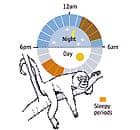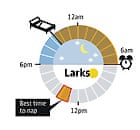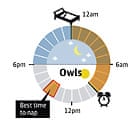A nap of 60 minutes improves alertness for up to 10 hours. Research on pilots shows that a 26-minute "Nasa" nap in flight (while the plane is manned by a copilot) enhanced performance by 34% and overall alertness by 54%. One Harvard study published last year showed that a 45-minute nap improves learning and memory. Napping reduces stress and lowers the risk of heart attack and stroke, diabetes, and excessive weight gain.
Getting even the briefest nap is better than nothing. A 2008 study in Düsseldorf showed that the onset of sleep may trigger active memory processes that remain effective even if sleep is limited to only a few minutes. And last year, a British study suggested that just knowing a nap was coming was enough to lower blood pressure.
Naps make you brainier, healthier, safer. But to understand how you can nap best, you need to understand your body.
• Jennifer Ackerman is the author of Sex Sleep Eat Drink Dream: A Day in the Life of Your Body
How long should you rest for?
In designing the optimal nap you need to grasp its potential components. During sleep, your brain's electrical activity goes through a five-phase cycle.
A short afternoon catnap of 20 minutes yields mostly Stage 2 sleep, which enhances alertness and concentration, elevates mood, and sharpens motor skills. To boost alertness on waking, you can drink a cup of coffee before you nap. Caffeine requires 20 or 30 minutes to take effect, so it will kick in just as you're waking. Naps of up to 45 minutes may also include rapid eye movement (REM) sleep, which enhances creative thinking and boosts sensory processing.
Limit your nap to 45 minutes or less, if you need to spring into action after dozing. Otherwise, you may drift into slow-wave sleep. Waking from this stage results in sleep inertia, that grogginess and disorientation that can last for half an hour or more.
But you might want to take a long nap, at least 90 minutes. Many of us get about an hour to an hour-and-a-half less sleep a night than we need. One recent study shows that the sleep-deprived brain toggles between normal activity and complete lapses, or failures, a dangerous state of slowed responses and foggy inattention. Sound familiar?
Naps of 90 to 120 minutes usually comprise all stages, including REM and deep slow-wave sleep, which helps to clear your mind, improve memory recall, and recoup lost sleep. Longer naps in the morning yield more REM sleep, while those in the afternoon offer more slow-wave sleep. A nap that is long enough to include a full sleep cycle, at least 90 minutes, will limit sleep inertia by allowing you to wake from REM sleep.
The science of sleep
Why do we need to nap?
Most mammals sleep for short periods throughout the day. Humans have consolidated sleep into one long period, but our bodies are programmed for two periods of intense sleepiness: in the early morning, from about 2am to 4am, and in the afternoon, between 1pm and 3pm. This midday wave of drowsiness is not due to heat or a heavy lunch (it occurs even if we skip eating) but from an afternoon quiescent phase in our physiology, which diminishes our reaction time, memory, coordination, mood, and alertness.
Are you a lark or an owl?
To determine the best time to nap, it helps to know your "chronotype". What time would you get up and go to sleep if you were entirely free to plan your day? If you're a lark, apt to wake as early as 6am and go to sleep around 9pm or 10pm, you're going to feel your nap need around 1pm or 1.30 pm.
If you're an owl, preferring to go to bed after midnight or 1am, and to wake around 8am or 9am, your afternoon "sleep gate" will open later, closer to 2.30pm or 3pm.





0 comentários :
Enviar um comentário